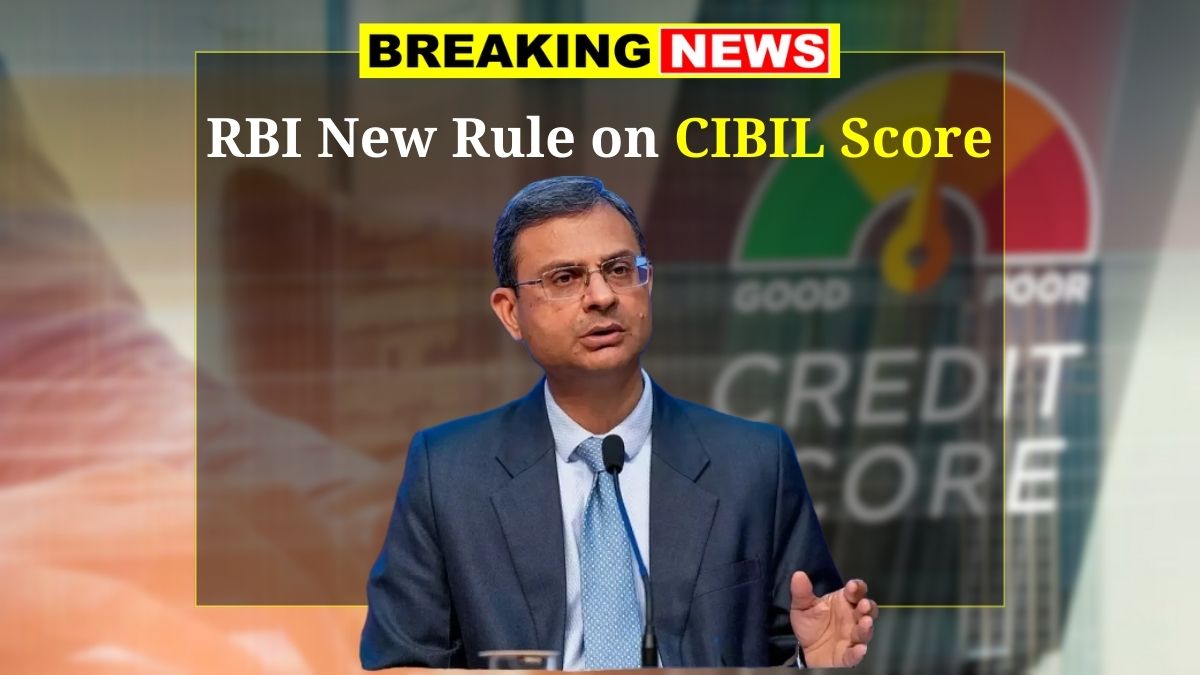RBI Rule on CIBIL Score – Getting a loan approved in India—whether it’s for a house, a car, or a personal emergency—often depends on one crucial number: your CIBIL score. Recently, the Reserve Bank of India (RBI) has made a big change in the way lenders look at this score before giving out loans. While this rule is meant to help borrowers, it could also mean that your loan takes longer to get approved. Let’s break it all down in a simple, casual way so you know what to expect.
What is the New Rule by RBI?
RBI now wants banks and other lending institutions to be more transparent about how they assess your credit score. Earlier, if your loan was delayed or rejected due to your CIBIL score, you wouldn’t always know why. That’s changed.
Here’s what the new rule includes:
- Banks have to tell you exactly why your CIBIL score dropped or why your loan is being held up.
- Credit scores must be updated more frequently, making them more accurate.
- If your loan is delayed or rejected due to your credit report, the bank must tell you in writing.
- You’ll get a 30-day buffer period to fix any errors in your CIBIL report before the bank can proceed with or deny your loan.
- Banks can’t just use an automated system to reject a loan—there must be a human reviewing your case.
Why This Rule Might Delay Your Loan
While this rule is borrower-friendly and encourages fairness, it does have a side effect: slower loan approvals. Since banks must double-check your credit information and give you time to fix errors, this adds extra steps in the process.
Some reasons your loan could get delayed now:
- Your name or PAN card details don’t match across records.
- You had a past loan dispute that’s still listed as unresolved.
- You applied for several loans in a short time, lowering your score.
- The bank made a technical error while updating your data.
What is CIBIL Score and Why Is It Important?
Your CIBIL score is a number between 300 and 900 that reflects how good you are with credit. A score above 750 is usually considered great for getting loans easily. If your score is below 700, lenders start becoming cautious. The score is based on factors like your loan repayment history, credit card usage, and how many loans you have taken in the past.
Here’s a quick idea of how banks view your score:
- 800 to 900 – Very strong. You’ll get quick approvals with lower interest rates.
- 750 to 799 – Good range. Most banks are comfortable approving your loan.
- 700 to 749 – Average. You may still get loans, but not at the best rates.
- 650 to 699 – Risky. Banks might ask for more documents or a co-applicant.
- Below 650 – Very risky. Getting a loan will be difficult unless corrected.
What You Should Do Right Now
If you’re planning to apply for a loan anytime soon, it’s better to be proactive rather than wait for surprises. Here’s what you can do:
- Check your CIBIL report at least once every few months.
- Dispute any errors immediately using the official CIBIL website.
- Avoid multiple loan or credit card applications in a short time span.
- Pay your EMIs and credit card dues on time—late payments hurt your score fast.
- Keep your credit usage low—ideally below 30 percent of your credit limit.
- Avoid closing old credit cards, unless there’s a strong reason—they help build a longer credit history.
Real-Life Case Studies
Let’s look at some common real-world examples. Rahul, a software engineer in Delhi, applied for a home loan. His application was put on hold because an old loan dispute still showed on his report—even though it had been resolved months ago. Thanks to the new rule, the bank informed him and allowed him to fix the issue, but it delayed his loan approval by three weeks.
Then there’s Pooja, a boutique owner in Mumbai. She didn’t know that an unpaid 500 rupees on a closed credit card brought down her score to 695. Her car loan approval got stuck. But since she got a 30-day window under the new RBI rule, she cleared the dues and got her score corrected—eventually getting the loan.
How Long Does It Take to Fix CIBIL Issues?
Fixing your score depends on the issue. Here’s a rough idea:
- Wrong name or personal info – 7 to 10 days
- Disputes with lenders – 15 to 30 days
- Paid loans showing as active – 10 to 20 days
- Late payments – May take 6 to 12 months of on-time repayment
- Too many loan applications – Avoid for at least 6 months
Why This New Rule is Actually Good
While delays are frustrating, this RBI rule is a blessing in disguise. It brings more clarity and gives you control over your credit report. No more secret rejections or surprise low scores. You get a fair chance to explain and fix mistakes before your loan is decided.
Some major benefits:
- More transparency
- Fewer false rejections
- Time to correct genuine mistakes
- Better communication with banks
- A stronger credit system overall
With this new RBI rule in place, your best bet is to stay alert, check your credit report regularly, and fix issues fast. If your score is already good, great—keep it that way. If not, this is your chance to work on it and avoid sudden shocks when you really need that loan. Remember, your credit health is in your hands—treat it like financial hygiene.





